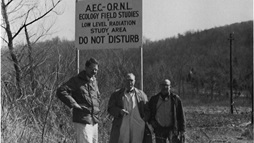
Ecologist Dan Nelson hauling in a gill net as part of the fish population survey of the Clinch River Study. (Photo by Oak Ridge National Laboratory via U.S. Department of Energy)
Researchers at federal sites such as Oak Ridge National Laboratory first developed many of the concepts and tools that ecologists still use today, according to the U.S. Department of Energy.
“The study of ecology is likely to evoke images of recycling signs or the ‘blue marble’ Earth from space associated with the environmental movement of the 1960s,” the U.S. Department of Energy Office of Science said in an article published online on June 28. “But in reality, ecology as a field largely developed to meet the need to monitor radioactive contamination in the Atomic Age.”
The federal government had a major knowledge gap after World War II, according to the article, which was written by Shannon Brescher Shea, senior writer/editor in DOE’s Office of Science. Specifically, the United States government needed to know more about the consequences of nuclear weapons use and production, from the effects of fallout to waste disposal.
The Atomic Energy Commission’s national laboratories were logical places to answer these questions, the article said.
“As the home of the Manhattan Project, these labs had the resources to figure out how nuclear contaminants can move through plants, animals, and natural systems as well as how radiation affects cellular behavior within these systems,” the article said.
The scientists went far beyond what they called “radioecology.” They tackled broader questions about the building blocks of natural systems. The researchers were at federal sites that became the U.S. Department of Energy’s Savannah River Ecology Laboratory, Oak Ridge National Laboratory, and the Pacific Northwest National Laboratory.
“Of course, the less fortunate side of this story is that many of the discoveries were a byproduct of radioactive contamination of the environment,” DOE said. “One of the tragedies of the Atomic Age is that in the early years, scientists poorly understood and, for the most part, grossly underestimated the effects of radioactivity on both humans and the environment. One unfortunate result was a great deal of damage to the environment around Atomic Energy Commission sites.”
But it was also partly the work of AEC-supported scientists in radioecology that increased awareness of radiation’s effects and hazards, according to DOE.
“This research helped lead to new, more environmentally conscious standards and practices for handling radioactive materials,” the department’s article said. “This work also helped lead to a better understanding of certain beneficial uses of radiation, such as radioactive tracers in medicine and a variety other fields.”
You can learn more in this story about ecological roots here. The DOE article has more information about the work at Oak Ridge, Hanford, and Savannah River, as well as the legacy of the national laboratories.
More information will be added as it becomes available.

Jerry Olson and Stanley Auerbach of Oak Ridge National Laboratory show Orlando Park, a biology professor at Northwestern University, the agricultural plot on upper White Oak Lake Bed. (Photo by Oak Ridge National Laboratory via U.S. Department of Energy)
Do you appreciate this story or our work in general? If so, please consider a monthly subscription to Oak Ridge Today. See our Subscribe page here. Thank you for reading Oak Ridge Today.
J Burnham says
Interesting article! A good bit of historical information for DOE. My only concern is this article makes it sound as if the ecology was founded by the scientists at DOE, or DOE related, sites; therefore, it makes it seem as if ecology is a “new” science. Ecology or Ecosystem Ecology traces it’s roots back to the 18th century (mid-1700’s) with Arcadian and Imperial Ecology. Imperial became dominant with Linnaeus and Systema Naturae. Britain, Spain and Portugal contributed a great deal with exploration studies. The German Alexander von Humboldt is often considered the father of ecology. The Park Grass experiment (oldest experiment on permanent grassland in the world) was started by Lawes and Gilbert in 1856, with the uniformity of the site being assessed in the five years prior. The history also moves forward with Darwin, Wallace, Warming, Malthus, Suess (biospheres) and Vernadsky and Tansley (ecosystems) into the 20th century. Just wanted additional to provide additional jumping off points for the readers. Thanks for the connection of DOE with the ecological world.
johnhuotari says
Thank for you for the additional information. We appreciate it.